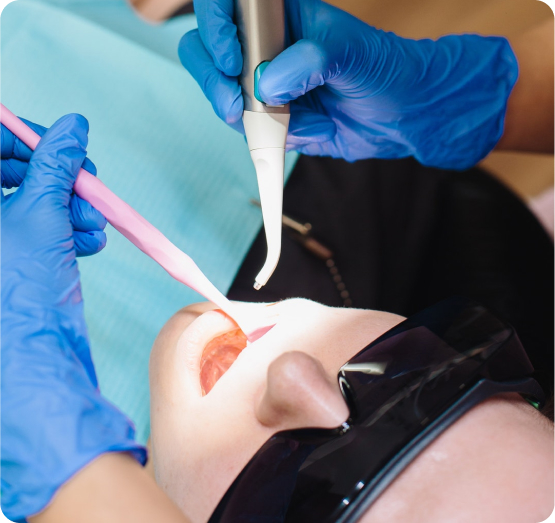

What is Root Canal Treatment?
A root canal is a dental treatment in Australia designed to save a tooth that is severely infected or decayed
When the soft tissue inside the tooth, known as the pulp, becomes inflamed or infected, it can cause pain and lead to abscesses. A root canal involves removing the damaged pulp, cleaning and disinfecting the inside of the tooth, then filling and sealing it. This treatment helps prevent further infection and can save your natural tooth, avoiding the need for extraction. It’s a common and effective way to maintain dental health and keep your smile intact.
The Treatment Process
The endodontic process takes three to four appointments to complete.
First, one our our dentists removes the nerve from the inside of the infected tooth. Then we put medication inside of the tooth and place a temporary filling in it. About three weeks later, we have you return for us to take the filling out and clean the tooth again, placing more medication inside of the tooth.
About three weeks later, you return for the third visit. If the tooth is fine and is not causing you any pain, the dentist will place a filling inside of the nerve chamber and then a permanent filling over the tooth. Once the process is complete, the tooth is still present, but it is now “dead.” Because of this, it is prone to breaking down over time.
To give the tooth strength and a long-term prognosis, we put a dental crown (cap) over it so that it does not break. A crown is almost always recommended when we perform a root canal.
We Give a Comfortable In-chair Root Canal TreatmentExperience to Reduce Your Pain
We understand pain is one of the biggest barriers for you to overcome when it comes to dental treatment. Our local anesthetics and pain reducing techniques will ensure your tooth and mouth are completely numb. It is unlikely you will feel any pain during the root canal treatment procedure. For comfortable in-chair root canal treatment, contact the friendly team at Tandara Dental.

Don’t Ignorethe Signs!
If you ignore the symptoms, it can be extremely costly and dangerous. It may mean that you might need the tooth extracted rather than a root canal. This process is far more strenuous.
Additionally, infection in one tooth can spread to other teeth, meaning ignoring one infected tooth could result in the extraction of many teeth.
When do I need aRoot Canal Treatment?
If your tooth is infected, abscessed or fractured, you will need a Root Canal. An extraction is needed if the tooth cannot be saved because it is too infected or damaged, and the structural integrity of the tooth is compromised. The pain and discomfort is short lived compared to an extraction, which can take up to two weeks to heal. Getting a root canal early on can prevent an extraction. Root canal treatments as compared to extractions, are gentle and more comfortable.
Root Canal Symptoms
- Persistent pain
- Sensitivity to heat and cold
- Tooth discolouration after trauma
- Swelling in your gums
- Chips or cracks in the tooth reaching the nerve
If you notice any of these symptoms or have any worries at all, you should contact Tandara Dental today to talk through a solution with one of our friendly trained professionals.

How We Provide aPain Free Root Canal Procedure
The Root Canal procedure takes three to four appointments to complete. The typical five step process is listed below:
-
1
First
Contact Tandara Dental today to organise your appointment. The quicker you book in, the happier your teeth will be.
-
2
Second
In the first appointment, the dentist removes the nerve from the inside of your infected tooth. Then we put medication inside of the tooth and place a temporary filling in it.
-
3
Third
Three to four weeks later, we have you return for us to clean the tooth again, placing more medication inside of the tooth.
-
4
Fourth
About three to four weeks after that , you return for the third visit. If the tooth is fine and is not causing you any pain, the dentist will place a filling inside of the nerve chamber, and then a permanent filling over the tooth.
-
5
Lastly
We highly recommend you get a crown put over the tooth. This will increase the resilience and strength of the tooth.
Payment PlansAvailable
Delaying your root canal treatment can result in infections, more extensive dental procedures and ongoing discomfort.
We offer an affordable root canal treatment solution to help restore your dental health.
You can also opt to pay for your root canal treatment using Afterpay or Zip Money, giving you the flexibility to pay over time with up to 12 months interest-free. Terms and conditions apply. Get in touch with us to learn more.



How much does aRoot Canal cost?
We know that dental costs can be intimidating. Tandara Dental offers some of the most competitive root canal costs in Australia and we offer payment plans so you can get the help you need.
We offer gentle, comfortable, painless, quick and affordable root canal dental solutions. If you need a root canal treatment, contact us to speak with one of our professionals today.
FAQ
Thanks to modern techniques and various local anesthetic options it’s unlikely that you’ll have any sensation in the tooth during treatment. For the first few days following treatment, your tooth may be a bit uncomfortable when biting. You can use over-the-counter or prescription medications to minimise any post-treatment discomfort.
For the majority of cases, the discomfort will subside dramatically within the first 24-48 hours. Any sensitivity to cold or heat will be gone after your visit. You may, however, experience mild discomfort to pressure that could last for several days after treatment.
To relieve any discomfort, we recommend taking over-the-counter anti-inflammatory analgesics such as ibuprofen or naproxen.
There are two to three stages to complete a root canal treatment, depending on your individual circumstance, so the treatment can require 2 – 3 visits to the dentist. However, the procedure itself typically takes around 60-90 minutes.
A root canal in Australia typically costs between $900-$1,400. This depends on if it is a front tooth, premolar or molar. Also, additional costs like crowns may increase the price. Contact your insurance provider and Tandara Dental to discuss costs and arrange payment plans if necessary today.
Yes, there are alternatives to a root canal. You could opt for a complete removal of the tooth. However, this may lead to more future complications.
A side effect of a root canal is that the tooth will be weaker than it previously was. The tooth is effectively “dead”. This is why we recommend putting a crown on the tooth so it has greater resilience and strength.
Do you want to discuss this with us?
From providing preventative check-ups to emergency care, our dentists and team offer outstanding care. If you’d like to find out more about sedation and sleep dentistry please contact our practice today!